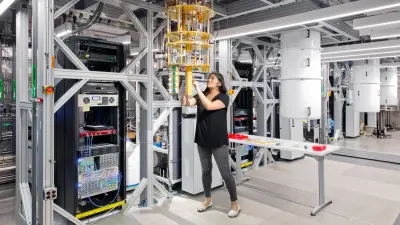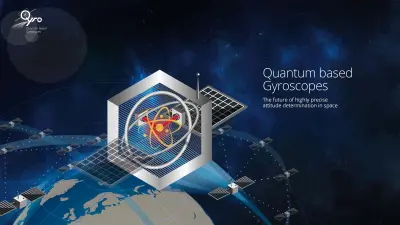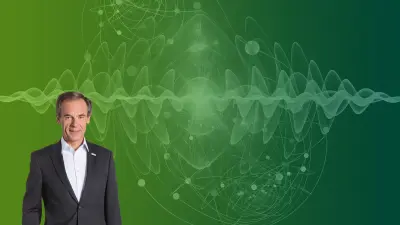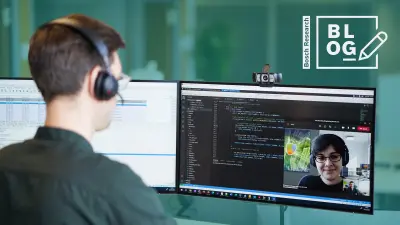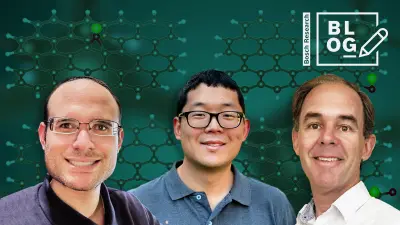Quantum technologies push the boundaries of what is possible
Technology with unique capabilities: Bosch Research is developing quantum algorithms to make quantum computers useful, in particular for materials development at Bosch, as well as quantum sensors for special future applications.

The world on a small scale works differently than the world we know on a large scale. It exhibits the quantum phenomena that are so surprising for us. Quantum technologies which include quantum computing, quantum sensors and quantum cryptography allow the technological exploitation of these phenomena. Quantum sensors and quantum computing in particular offer great potential for industrial applications and are therefore important research fields for Bosch.
With its great expertise in quantum physics, microelectronics and MEMS technology, Bosch Research is ideally placed to drive the development of quantum technologies for important applications. We are paving the way for groundbreaking innovations — for example quantum sensors which will revolutionize medical diagnostics. Using quantum computing algorithms, it will also be possible to adequately simulate new materials in which quantum effects play a central role and conventional simulation approaches have so far failed.
Quantum sensors: precision that sets new standards
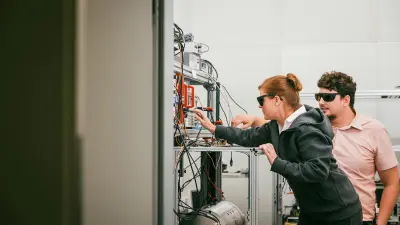
Bosch Research develops particularly high-performance sensors which use quantum effect to determine physical measured variables. There are significant differences between these sensors and conventional sensors such as MEMS sensors, shunt resistors or hall sensors: the latter use macroscopic, measurable, often directly visible effects. In a conventional watch, for example, vibrations of a spring are used for measurement. In contrast, quantum systems are based on the quantum mechanical properties of individual atoms, photons or elementary magnets. And they can also use effects that are unavailable in classic systems, so-called quantum effects such as superposition or entanglement. Quantum sensors thus have various advantages compared to conventional sensors – including their very high precision and reproducibility.
Specifically, Bosch Research is developing two types of quantum sensors: firstly, so-called quantum magnetometers for measuring very small magnetic fields with very high precision and secondly, quantum gyroscopes, i.e. quantum-based angular rate sensors that can be used to track even tiny rotational movements.
Quantum magnetometers will be invaluable in the fight against neurological diseases for example. As a result, doctors will be able to recognize changes in magnetic fields in the human brain. It will thus be possible to diagnose Alzheimer’s or Parkinson’s disease for example at a much earlier stage — more precisely, easily and cheaply than before. Prostheses can also be controlled by magnetic field signals from the part of the brain responsible for movement (the motor cortex). This is a special type of “brain-machine interface”. However, quantum technology will revolutionize not only medicine.
In autonomous systems, for example satellites in space, the second type of quantum sensors — quantum gyroscopes — will be used. With this type of quantum sensor, it will be possible to measure rotational movements that are thousands of times slower than those of the hour hand of a standard clock. They will also make it possible to determine the location of objects with great precision — even in space.
With these innovations, Bosch is consolidating its leading position in the development of sensors for selected applications.
Quantum computing: a faster and more resource-efficient approach to new materials
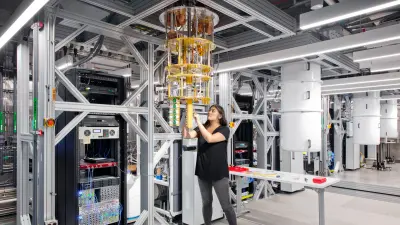
The second important field of research in the area of quantum technologies at Bosch Research is quantum computing. One domain in which quantum computing is particularly useful is the simulation of materials. Here, quantum computers can perform in minutes or hours tasks that would take conventional computers days or even weeks. This saves resources, time and money. After all, materials are essentially quantum systems, as are the quantum computers themselves. Materials research will benefit greatly from this fact. New materials for electrified mobility, for example for use in batteries and fuel cells, as well as new catalysts or sensor materials will thus be developed much more quickly and chemical processes can be optimized more rapidly than before.
So-called transition metal oxides are another possible application for quantum computing in materials science. Given the strong interaction between their electrons, calculating the properties of these materials accurately on conventional computers was an extremely time-consuming task or was not possible at all. But quantum computers could bring improvements in other areas as well: For example in process optimization tasks, in conventional simulations and in artificial intelligence (AI).
Concentrated quantum power: Bosch relies on cooperation — nationally and internationally
Quantum technologies are a relatively new field of research. A great deal of research and development work is still needed before they can unleash their full potential. Quantum sensors will probably be used on a larger scale within a decade. But technological development is by no means the end of the story. Applications and business models must be adapted, a powerful ecosystem of quantum technology companies must be built up, value chains must be established and suitable highly qualified specialists must be found or trained — to name just a few aspects. We are convinced that quantum technologies have a great future. Bosch therefore established its own start-up company for the industrialization of quantum sensors in 2022.
Bosch is also keen to ensure that Germany and Europe assert themselves as strong players in the quantum industry. We are therefore carrying out research work with various partners and are involved in national and international projects and committees. Bosch is a founding member of the European Quantum Industry Consortium (QuIC) and the consortium’s vice president works for the group. Represented by Bosch Research, we are also a founding member of the German Quantum Technology and Application Consortium (QUTAC) and are very active within that organization too. At the same time, Bosch is a partner in a number of publicly funded projects, both on a European level and in Germany. In 2022, Bosch launched a collaboration with IBM in the area of quantum computing, focusing on material simulation of sustainable materials for electrified mobility. Bosch Research is developing the quantum algorithms for this and testing them on IBM’s cloud-based quantum computing fleet. In the future, the properties of new materials will be determined in a way that would not be feasible with conventional computers given the computing time or memory requirements.

